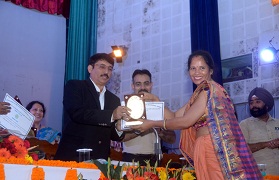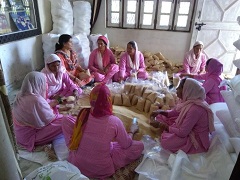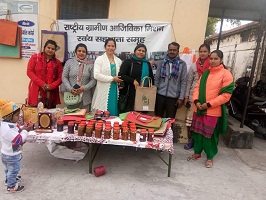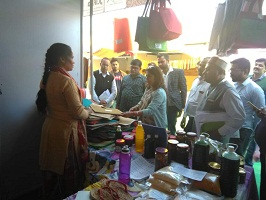Time and again, it has been proven that with inspiration and courage, one can achieve great heights. Shyama Devi is one fine example of the same. She might now be a popular name among the women of her village, but she has faced her fair share of difficulties and struggles on her path to empowerment.


Life Full of Problems:
Shyama belongs to the Village Fatehpur, Block Vikasnagar, District Dehradun. She is a house-wife, married to Shri Trilok Singh. Shyama lives in a village, where besides being uneducated, the women were not even allowed to step outside of their houses without their husband’s permission. The same was the case with Shyama, whose husband being a drunkard did not even earn enough money to fulfill the family’s basic needs. Being married to Shri Trilok out of her own will, Shyama’s family also did not turned up to support her financially. Then, came the time when Shri Trilok lost his job and everything seemed to fall apart for her family. The situation even worsened to the extent that they had to even sell their house for their survival. This even lead their children to drop out from their schools for not having able to pay the school fees.
The Path to success:
Being active in nature made Shyama Devi to set-up and start the Mahila Jagrati Samooh. Upon realizing the problems of economic constraints and lack of independence among the women group of her village, Shyama Devi firmly took her own stand and joined a group of women being addressed by the Krishi Vigyan Kendra and Block officials on women Self-Help Groups. By gathering the information from the KVK and other line departments, Shyama started her journey to for educating her fellow women villagers about these groups.
For realizing her dreams, Shyama held several meetings for about four consecutive months in order to educate the women about the importance of financial stability and independence in their lives. On witnessing the never-ending efforts made by Shyama Devi, the Mahila Jagrati Samooh with 10 women members from on Fatehpur village came into its official formations on 19th September - 2012. The aim of the Samooh was to make the women of the village earn some money for their livelihood. This made the women groups to contribute an amount of Rs. 100 per month in the form of savings.
The path was full of hurdles:
Due to the poverty, Shyama and her fellow village women were unable to even contribute a small amount of fund of Rs. 100 for the Samooh which lead the Samooh to be broken. This made every member to approach the Block Officers to withdraw their names from the Samooh. But, it was at this time that the KVK and Block officials educated the women groups about the importance of running the Samooh successfully and also made them aware about the different government schemes for their upliftment. Following this, the women groups were guided to follow the 5 rules that stated: weekly meetings, weekly savings, weekly loaning, correct loan return and maintaining the records. By following such guidelines, the Samooh once came into its formation on 1st January - 2014 having 25 old and new members with Shyama Devi elected as the new president. Under her leadership, the group was motivated to rejuvenate the group with some income generating activities.
Where the KVK intervened:
In order to provide its contribution in the empowerment of women groups of the village, the Krishi Vigyan Kendra, Dhakrani joined its hands with Shyama and started its working in the designated direction. For realizing the purpose, the KVK officials kept on interacting with the Mahila Jagrati Samooh members from time to time. On learning about the eagerness of the women groups for empowering themselves, the KVK officials made them aware about the new and improved agricultural practices and also the ways by adopting which they can too achieve the economic independence by preparing small handicrafts items.


During this, Shyama Devi also made the women groups to learn about doing some local business with the easily available crop/raw materials. In the process, the KVK imparted the women groups with the training on packaging of food items, preservation techniques, value addition etc., along with making them learn about the marketing of such products efficiently. This helped the women to become financially stable and independent.
In the due course of time, the women groups started saving more money along with developing self-confidence. This made them to explore out more work opportunities. The Self-Help Groups got trained on Jute bag making and the women who were masters in stitching, got themselves employed to make the Jute bags. In this venture, the KVK helped them in the value addition by imparting them the training on designer bag making, block printing, etc. In the meanwhile, due to ban on polythene bags in the District, the group also got itself trained in producing the non-woven eco-friendly bags, which were on high demand at that time. Hence, it made other women also to join the group and start working on different aspects too.
Financial Gains:
The KVK did helped in sensitizing the women groups about the government’s various developmental schemes namely Take Home Rashion, etc. The group also got attached with the NRLM and received an amount of Rs. 1,00,000 for its future endeavours. Now, the group members started the work of packaging of Rashion at home which was supplied to different Anganbadies. As a successful woman, Shyama motivated other women and started working on other fields like preservation of fruits and vegetables. Today, the annual turnover of group from the last one year was Rs. 1,14,00,000.00 and the total annual saving of one group members is around Rs. 2,40,00.00. This made them not only economically independent, but also sensitive to the other vulnerable poor women of the society.
Active Social worker:
Not only the economic empowerment, but the group is also engaged in other social activities too. The group members are working for the poor Anganbadies by providing free water filters and fans, preparing toilets, and also actively contributing in the Swachchata Sewa Abhiyaan.
Awards and Recognitions:
With her firm aim to empower herself along with empowering the other women in her nearby areas, Shyama Devi did made a remarkable effort in Mahila Jagrati Samooh by doing outstanding work with the local produce. For her hard work and dedication, Shyama Devi even got nominated by the KVK, Dhakrani for the Rajya Stareeya Mahila Samman Puraskaar, which she was conferred with on 5th October - 2018 from the Vice Chancellor, G.B. Pant University of Agriculture and Technology, Pantnagar. For displaying the brilliant work, the Samooh was also awarded and recognized by Smt. Manisha Panwar, Director, Uttarakhand Rajya Aajivika Mission at the Uttarakhand Himaanya Saras Mela. Following the success, the Mahila Jagrati Samooh along with 14 similar Samoohs with the help of Block Mission Prabhandak founded Jai Mata Di, Gram Sangathan on 23rd June - 2018.
A successful Entrepreneur:
Shyama Devi, now, a trained professional from KVK and RSETI, Shankarpur Dehradun, has become a woman of substance in her own study as she teaches and educates not only women from her Samooh, but also the women from the different districts of Uttarakhand as well. She is a master trainer in OBC, RSETI. From an impoverished homemaker to a successful entrepreneur and also a trusted counsellor, the story of Shyama Devi of Fatehpur Village is an inspiring tale of how women in rural India can take charge of their own destiny. Shyama, a lady who was not able to even pay for her daily needs and her children’s fees at one time, now owns a house with a car today.
Seeing Shyama’s hard work, now her husband also lends his help in the group activities. In Shyama’s own words, “I love my work. My biggest achievement was that I first tried everything, gained experience and then advised others.” Shyama Devi continues to thrive at her SHG work and spread the awareness amongst other women to make a difference in their lives.
(Source: Krishi Vigyan Kendra, Dhakrani)







फेसबुक पर लाइक करें
यूट्यूब पर सदस्यता लें
X पर फॉलो करना X
इंस्टाग्राम पर लाइक करें